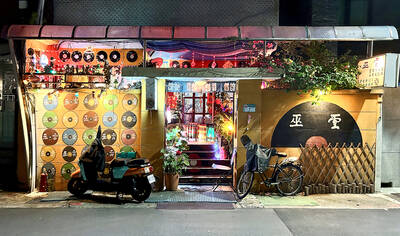When it opened late last year, Taipei's first Russian theme restaurant caused quite a sensation. Offering diners the chance to wine and dine in a cold room measuring -100C, the restaurant/bakery/ice-cream parlor's initial bout of publicity paid off. Over the past five months it has managed to build up a cult following among diners looking for something different.
The interior design is simple, with, thankfully, no kitsch photos of the Kremlin. The tables are far enough apart to allow for a modicum of privacy, yet close enough so the waitstaff has no excuse for ignoring the wants of a hungry diner.
There is one very important thing to bear in mind before venturing off to Salt & Bread in search of chow from the world's largest country: Those looking for more traditional fare such as pelmeny or vareniky will be disappointed. The menu is more representative of Stalinist expansionism than Romanov realities. Many of the dishes originate well west of the Caucasus, with German sausages, Austrian pork cutlets and Italian pastas just a few of the non-Russian dishes on offer.

PHOTO: GAVIN PHIPPS, TAIPEI TIMES
Not that this really matters, as the menu is solid and has enough vestiges of European flavors to satisfy most diners. Along with the handful of genuine Russian dishes like beef stroganoff (NT$520) and chicken Kiev (NT$460) the joint serves up plenty of its own creations. Patty "St Petersburg" (NT$420), red wine ox tongue (NT$800), braised T-bone (NT$620) and beef goulash (NT$460) are some of the most popular.
Those looking for a pleasant lunch that doesn't break the bank should find Salt & Breads' NT$480 lunch specials quite agreeable. Diners get to choose from four soups and half a dozen main courses. Tea or coffee and ice cream come with all combinations.
While the eatery's savory selections are passable and fairly satisfying, the joint's ice cream creations are something to behold. Costing from NT$260 to NT$600, the chilled delights can be eaten alone but because of there sheer size are best shared. Boasting equally kitschy Russian theme names like Catherine's Great Crown, Cruising Along the Yenisei, Catherine's Great Secret Garden, Lazurite in Baikal Lake and Feast of Russia will gratify those with a sweet tooth.
Along with the edibles Salt & Bread also stocks several types of vodka as well as several varieties of Russia's other most popular liquid export, Baltika beer.
The bottom line is that while the quality of both the food and the service are a cut above those all too often endured at many locally run western-style eateries, to have the chutzpah to call Salt & Bread a "Russian" restaurant is a wee bit rich!

The Lee (李) family migrated to Taiwan in trickles many decades ago. Born in Myanmar, they are ethnically Chinese and their first language is Yunnanese, from China’s Yunnan Province. Today, they run a cozy little restaurant in Taipei’s student stomping ground, near National Taiwan University (NTU), serving up a daily pre-selected menu that pays homage to their blended Yunnan-Burmese heritage, where lemongrass and curry leaves sit beside century egg and pickled woodear mushrooms. Wu Yun (巫雲) is more akin to a family home that has set up tables and chairs and welcomed strangers to cozy up and share a meal

Dec. 8 to Dec. 14 Chang-Lee Te-ho (張李德和) had her father’s words etched into stone as her personal motto: “Even as a woman, you should master at least one art.” She went on to excel in seven — classical poetry, lyrical poetry, calligraphy, painting, music, chess and embroidery — and was also a respected educator, charity organizer and provincial assemblywoman. Among her many monikers was “Poetry Mother” (詩媽). While her father Lee Chao-yuan’s (李昭元) phrasing reflected the social norms of the 1890s, it was relatively progressive for the time. He personally taught Chang-Lee the Chinese classics until she entered public

Last week writer Wei Lingling (魏玲靈) unloaded a remarkably conventional pro-China column in the Wall Street Journal (“From Bush’s Rebuke to Trump’s Whisper: Navigating a Geopolitical Flashpoint,” Dec 2, 2025). Wei alleged that in a phone call, US President Donald Trump advised Japanese Prime Minister Sanae Takaichi not to provoke the People’s Republic of China (PRC) over Taiwan. Wei’s claim was categorically denied by Japanese government sources. Trump’s call to Takaichi, Wei said, was just like the moment in 2003 when former US president George Bush stood next to former Chinese premier Wen Jia-bao (溫家寶) and criticized former president Chen

President William Lai (賴清德) has proposed a NT$1.25 trillion (US$40 billion) special eight-year budget that intends to bolster Taiwan’s national defense, with a “T-Dome” plan to create “an unassailable Taiwan, safeguarded by innovation and technology” as its centerpiece. This is an interesting test for the Chinese Nationalist Party (KMT), and how they handle it will likely provide some answers as to where the party currently stands. Naturally, the Lai administration and his Democratic Progressive Party (DPP) are for it, as are the Americans. The Chinese Communist Party (CCP) is not. The interests and agendas of those three are clear, but